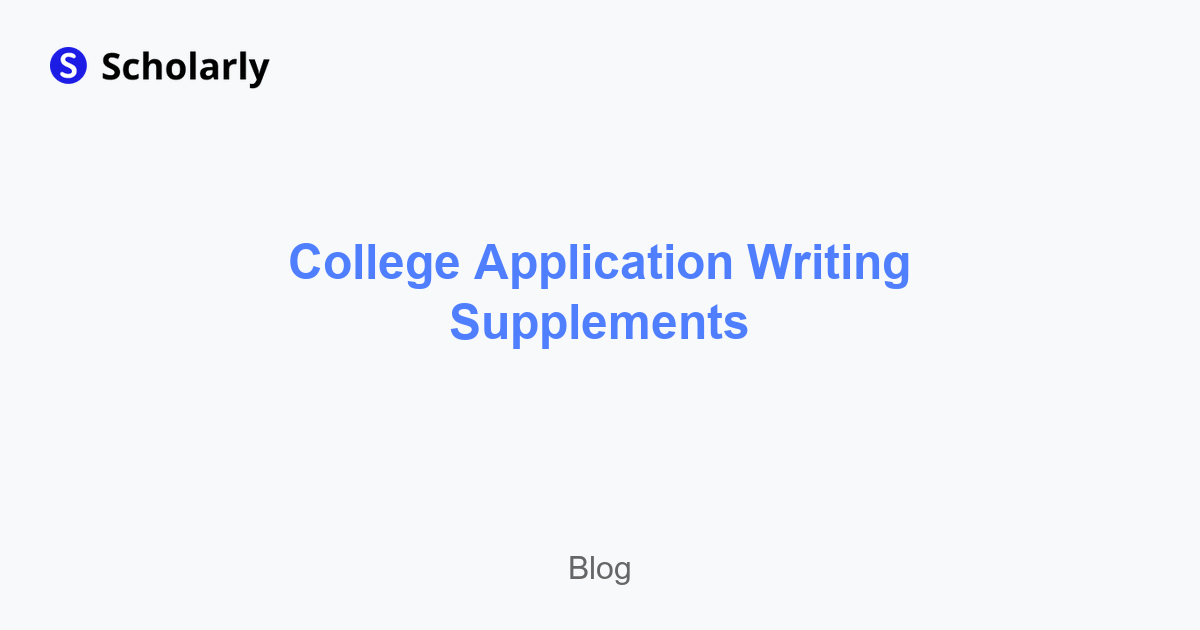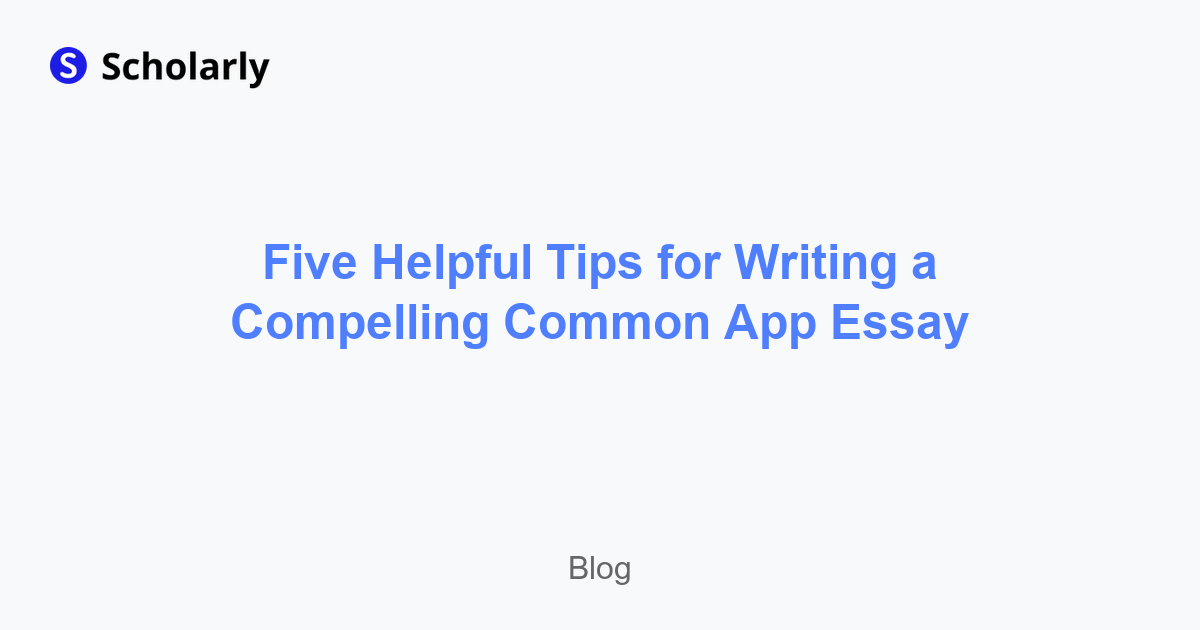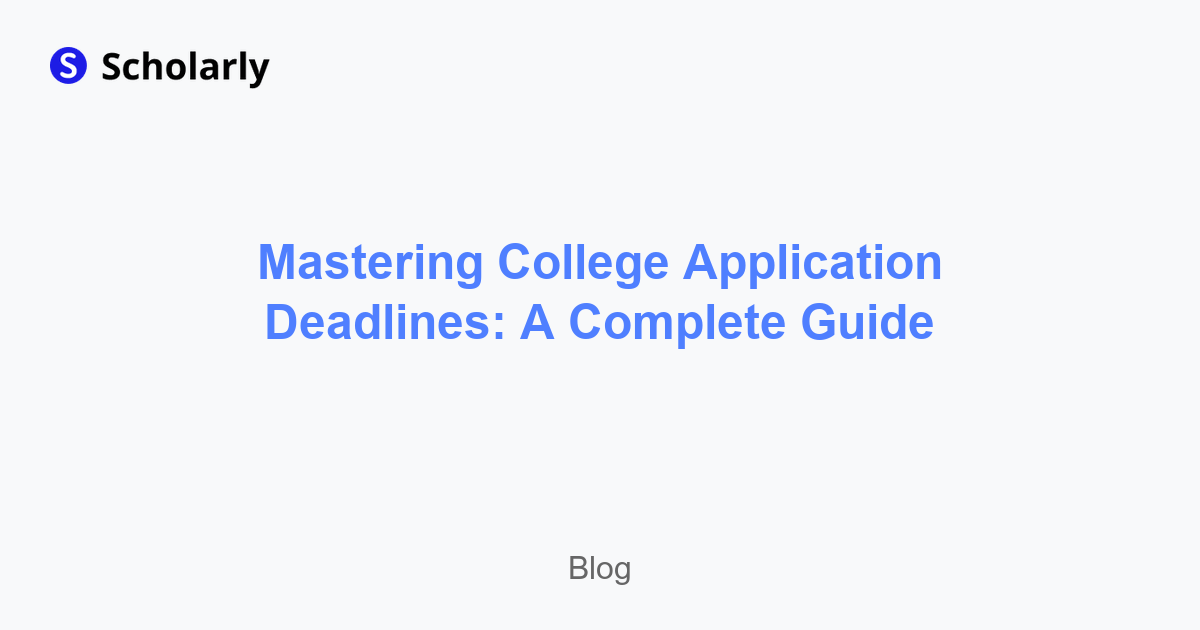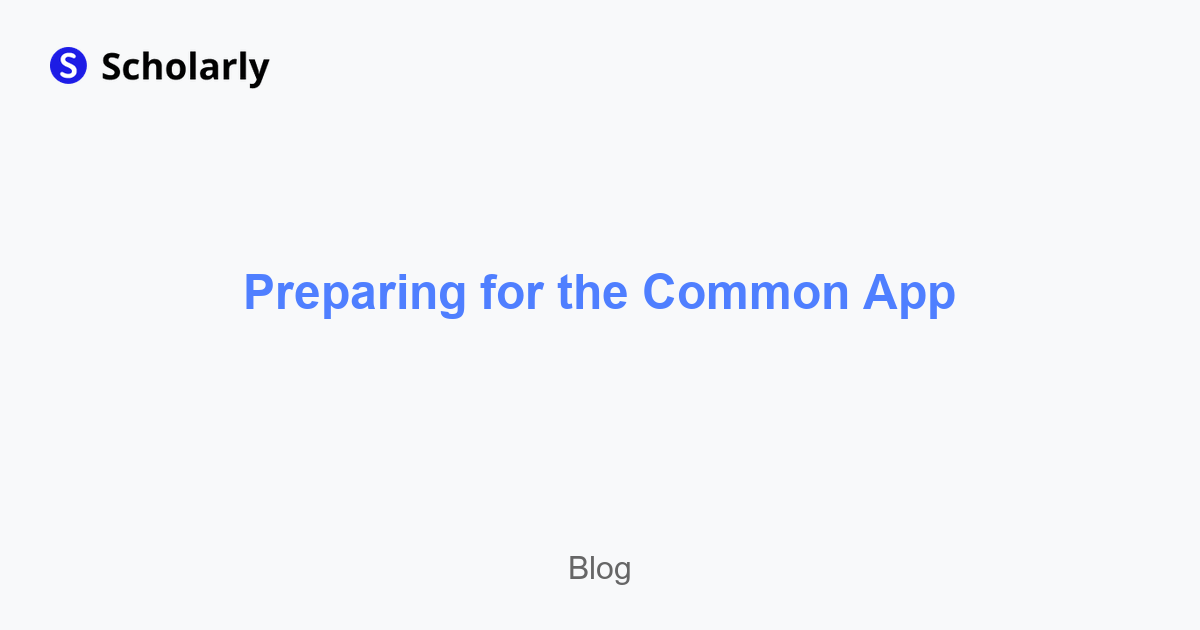College Application Writing Supplements
Supplemental essays can make or break your application at competitive schools. Here's how to write ones that actually help you stand out.

You've spent weeks perfecting your Common App essay. You're proud of it. Then you open your college application portal and see it: "Please complete the following supplemental essays."
Your heart sinks. More essays? How many? How long?
Welcome to supplemental essays, the part of college applications that many students underestimate until it's too late.
Here's the truth: at highly competitive schools, supplemental essays matter just as much as your main essay. Sometimes more. They're your chance to show why you specifically want to attend their school, how you'll contribute to their community, and why you're a perfect fit.
What Are Supplemental Essays?
Supplemental essays are additional pieces of writing required by many colleges beyond your main Common App or Coalition App personal statement.
These essays are specific to each school. Northwestern's supplements are different from Duke's. USC has different questions than UCLA.
The typical competitive school requires 1-5 supplemental essays ranging from 150 to 650 words each. Some schools have one short "Why Us?" essay. Others have multiple questions exploring different aspects of your interests, background, and fit.
Key characteristic: Unlike your main personal statement, which goes to every school, supplemental essays must be customized for each institution.
Why Supplemental Essays Matter
At highly selective schools where thousands of applicants have similar grades and test scores, supplemental essays help admissions officers differentiate between candidates.
What Admissions Officers Learn From Your Supplements
Demonstrated interest: Did you research the school, or are you just applying because of its ranking?
Genuine fit: Do your goals, interests, and values actually align with what the school offers?
Contribution to campus: What would you bring to their community?
Writing ability: Can you write clearly and thoughtfully about multiple topics?
Effort and care: Did you put real thought into this application, or did you rush through it?
One admissions officer at a top-20 university put it this way: "We use the personal statement to understand who you are as a person. We use the supplemental essays to understand if you belong here specifically."
Poor supplemental essays can sink an otherwise strong application. Great ones can tip borderline candidates into the accepted pile.
The Most Common Types of Supplemental Essays
While every school has unique prompts, most fall into recognizable categories:
1. "Why This College?"
This is the most common supplemental essay, and the one most students mess up.
The prompt usually asks: Why do you want to attend this school? What draws you to this institution?
What they're really asking: Have you done your research? Do you understand what makes us unique? Is this a thoughtful choice, or are you just applying because we're ranked high?
What works:
- Specific programs, courses, or professors you're excited about
- Unique opportunities that align with your interests
- Campus culture or values that resonate with you
- How the school's specific resources help you achieve your goals
What doesn't work:
- Generic statements that could apply to any school ("prestigious institution," "excellent academics," "beautiful campus")
- Only mentioning ranking or reputation
- Flattery without substance
- Information they already know about themselves
2. "Why This Major?" or Academic Interest Essays
The prompt asks: What academic area interests you? Why do you want to study this subject? What experiences led to this interest?
What they're really asking: Do you have genuine intellectual curiosity? Have you explored this field? Is your interest thoughtful and informed?
What works:
- Specific experiences that sparked or deepened your interest
- Questions or problems in the field you find fascinating
- How you've already explored this interest (courses, reading, projects, activities)
- What you hope to contribute to or learn about in this field
What doesn't work:
- Vague statements about "always loving" a subject
- Only mentioning career prospects or salary potential
- Not demonstrating actual knowledge about the field
- Choosing a major just because you think it'll help you get in
3. Community and Diversity Essays
The prompt asks: How will you contribute to our community? What perspectives would you bring? How has your background shaped you?
What they're really asking: Will you add something valuable to our campus? How do you think about community? What unique perspectives do you offer?
What works:
- Specific aspects of your background, identity, or experiences
- How your perspective differs from others and why that matters
- Concrete ways you've contributed to communities before
- Thoughtful reflection on how diversity enriches learning
What doesn't work:
- Just describing your identity without reflection
- Claiming you'll "add diversity" without explaining how or why
- Making your entire personality about one aspect of your identity
- Avoiding the question because you don't think you're "diverse enough"
4. Extracurricular or Activity Essays
The prompt asks: Describe an activity that's meaningful to you. What would you continue in college? How have you spent your time?
What they're really asking: What do you care about enough to dedicate significant time to? What would you bring to our extracurricular community?
What works:
- Deep reflection on why this activity matters to you
- Specific impact you've made or lessons you've learned
- Growth and development through this involvement
- How this activity connects to who you are
What doesn't work:
- Just listing accomplishments (that's what the activities section is for)
- Picking an activity only because it sounds impressive
- Superficial descriptions without meaningful reflection
- Not explaining why it matters to you personally
5. Creative or Unusual Prompts
Some schools ask quirky questions designed to see how you think creatively.
Examples from real schools:
- "What's your favorite word and why?" (University of Virginia)
- "Create your own prompt" (Several schools)
- "What's something you're looking forward to experiencing in college?" (Various schools)
What works:
- Authenticity and personality
- Creative thinking while still being genuine
- Using the prompt to reveal something meaningful about yourself
- Having fun with it while still taking it seriously
What doesn't work:
- Trying too hard to be clever or different
- Gimmicks that don't actually reveal who you are
- Not taking the prompt seriously
- Generic responses that could come from anyone
How to Write Standout Supplemental Essays
Step 1: Research Each School Thoroughly
You can't write a great "Why This College?" essay without actually understanding what makes that college unique.
Research checklist:
- Browse the school's website (academics, student life, values)
- Read about specific programs, centers, or initiatives related to your interests
- Look up professors whose research interests you
- Explore student organizations you'd join
- Read student newspapers or blogs to understand campus culture
- Watch videos or virtual tours
- If possible, visit campus or attend virtual events
Take notes on what genuinely excites you. Don't just look for things to mention in your essay. Look for reasons you'd actually want to attend.
Step 2: Be Specific
The difference between a mediocre supplement and a great one is specificity.
Weak example: "I want to attend Northwestern because of its excellent journalism program and location in Chicago. I've always been interested in media and communications, and Northwestern would give me great opportunities in this field."
Strong example: "Northwestern's Medill School would let me combine my interest in data journalism with hands-on reporting through courses like Multimedia Storytelling. I'm particularly drawn to the Medill Justice Project, which aligns with my work investigating local education policy for my school newspaper. Being near Chicago means access to newsrooms like the Tribune and startups like The Markup, where I could pursue Medill's quarter-long journalism residency."
See the difference? The second example mentions specific programs, courses, opportunities, and connects them to the student's actual interests and experiences.
Step 3: Make It Personal
Don't just research what the school offers. Connect those offerings to your own goals, interests, and experiences.
Structure your essays like this:
- Your interest/goal/experience
- Specific school resource or opportunity
- How they connect and what you'll do with it
Example: "After spending two summers teaching robotics to elementary students, I realized engineering education needs better tools for making abstract concepts concrete. [Personal experience] Duke's Innovation Co-Lab and DukeEngage program would let me develop hands-on learning tools while testing them with local students through community partnerships. [Specific school resources] I'd bring my experience designing low-cost robotics kits to collaborate with engineering and education students on projects that serve Durham schools. [Connection and contribution]"
Step 4: Show, Don't Just Tell
Instead of claiming you're passionate, curious, or committed, demonstrate those qualities through specific examples and stories.
Telling: "I'm deeply passionate about environmental science and committed to sustainability."
Showing: "When I discovered our school cafeteria was throwing away 200 pounds of food weekly, I spent three months researching composting systems, persuading administration to pilot a program, and recruiting 40 student volunteers. Watching that first batch of compost feed our campus garden made me realize environmental solutions work best when they're local, practical, and community-driven."
Step 5: Avoid Common Mistakes
Mistake 1: Recycling essays between schools
Never copy-paste a supplement from one school to another. Admissions officers can tell. Every supplement should be written specifically for that school.
Mistake 2: Writing what you think they want to hear
Admissions officers read thousands of essays. They can spot inauthentic writing immediately. Write about what genuinely interests you.
Mistake 3: Just summarizing information from your activities list
Your supplements should add new information and insight, not repeat what's already in your application.
Mistake 4: Forgetting to proofread
Typos and grammatical errors undermine even the strongest content. Read your essays out loud. Have someone else review them. Check that you didn't leave in another school's name.
Mistake 5: Being too formal or academic
Write in your authentic voice. You're not writing a research paper. You're helping admissions officers get to know you.
The Supplement Writing Process
Timeline
Summer before senior year:
- Make a spreadsheet of all schools and their supplement requirements
- Start researching schools
- Begin drafting supplements for early application schools
September:
- Finalize supplements for Early Decision/Early Action schools
- Continue research and drafting for Regular Decision schools
October:
- Submit early application supplements
- Work on Regular Decision supplements
November-December:
- Finalize and submit Regular Decision supplements
The Writing Steps
- Brainstorm: After researching a school, list everything that genuinely appeals to you
- Outline: Plan what you'll include before you start writing
- Draft: Write your first version without worrying about word count
- Edit: Cut unnecessary words, add specificity, strengthen connections
- Proofread: Check for errors, awkward phrasing, and clarity
- Get feedback: Have someone who knows you read it. Does it sound like you?
Managing Multiple Supplements
If you're applying to 10 schools, you might have 20-30 supplemental essays to write. That's overwhelming.
Strategies to manage the workload:
Start early: Don't wait until the last minute. Begin in summer.
Prioritize: Work on early deadline schools first, then schools you're most excited about.
Look for overlap: Some prompts are similar across schools. You can't copy-paste, but you can use similar content adapted for each school.
Set daily goals: Write one supplement per day, or dedicate specific time blocks to supplement writing.
Use a checklist: Track which schools need which supplements and their word counts.
Take breaks: Writing 30 essays in a row leads to burnout and bad writing. Pace yourself.
The Bottom Line
Supplemental essays are not an afterthought. They're a critical part of your college application, especially at competitive schools.
The students who get accepted aren't necessarily the ones with the highest stats. They're often the ones who wrote compelling, specific, authentic supplemental essays that demonstrated genuine fit and contribution.
Take the time to research schools thoroughly. Be specific. Be genuine. Show how you and the school are a mutual good fit.
Your Common App essay shows who you are. Your supplemental essays show why you belong at that specific school.
Both matter. Both deserve your best effort.
Ready to Strengthen Your Application?
Writing great supplemental essays is important. But so is having strong academics and test scores to back them up.
Scholarly helps you master the content you need for competitive grades and test scores. Upload your study materials and use AI-powered flashcards to retain what you learn.
Stand out in every part of your application.
Try Our Popular AI Study Tools
Transform your study materials into interactive learning experiences with our most popular AI-powered tools:
PDF to Flashcards
Convert lecture notes and textbooks into study flashcards instantly
Text to Flashcards
Turn any text or notes into comprehensive flashcard sets
Image to Flashcards
Convert diagrams and handwritten notes into digital flashcards
YouTube to Flashcards
Generate flashcards from educational video content



